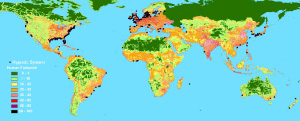|
||
Global scale spread of coastal dead zones (Diaz & Rosenberg 2008). Click image to enlarge. |
Michael's research involves biogeochemistry - how organic and inorganic molecules are transformed, and the regional scale cycles of nitrogen, phosphorus and carbon. "Now we have the global scale focus on carbon and nitrogen cycling, and that's relevant to what goes on in a region like Chesapeake Bay," he says "There's a global relevance for what we do in our little back yard." His work connects directly to understanding how humans have influences on coastal systems around the world.
Michael's graduate school advisor, H.T. Odum, told his students that their generation of scientists would be tackling the big complex global and regional problems – and in Michael's case, that has turned out to be true. "We try to put what we learn in the context of other systems," he says. "We know there are lots of other regions experiencing hypoxia and that some of them have a long history. That's valuable information for us to improve our understanding of our systems."
"The notion that these ideas can be applied elsewhere is very compelling." |
The UN facilities continue to invest money in addressing hypoxia, and seeding restoration activities. "They have an interest in the remediation of hypoxia and eutrophication in developing countries, including China," says Michael. He serves on a Scientific and Technical Advisory Panel to supply expert consultation for projects on hypoxia in the coastal zone, as well as belonging to a group in the United Nations Environment Program Global Environment Facility that addresses environmental problems in the third world. "Several colleagues are interested in using this as a springboard to create an international group that can have a coordinated impact," says Michael. "There is a pre-formed scientific community in key fields that interact regularly, argue together, share research and so forth, and the dead zone group has some of those characteristics. The international aspect of dead zone research is natural, and that evolved on its own."


